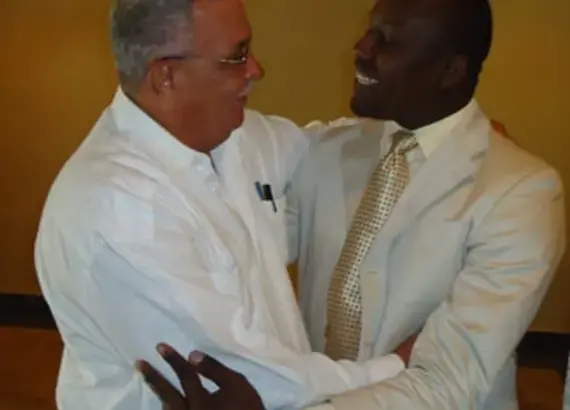
Success Story
NDI Calls on Haitian Presidential Candidates to Abide by Code of Conduct
NDI urged the two candidates competing in Haiti’s second round presidential election Sunday to abide by the terms of a code of conduct they both signed that commits them to respect election laws, reject violence, and abide by the results of the electoral process.
In the code, the two candidates – Mirlande Manigat and Michel Martelly – agreed to “accept the results of the election” and in the case of election disputes “resolve any differences through dialogue, conciliation, and mediation.” NDI facilitated the development of the code, which was released publicly on March 17. Representatives of the two candidates, pictured at left, came together on Friday for a show of solidarity in support of the code.
The candidates also committed to “banning and condemning the use of arms, physical aggression, slander, corruption and rhetoric based on discrimination (religious, ethical or sexual) as battle instruments for power.”
In the lead-up to election day, NDI called on the candidates to follow the code’s principles to ensure a credible election. The Institute noted that the first round election in November was chaotic, marred by widespread disfranchisement of voters, ballot box stuffing, and violence and intimidation.
In the poll’s aftermath, Haiti’s electoral council originally announced Manigat, a former first lady, as the top vote-getter and Jude Célestin, perceived as the favored candidate of outgoing President René Preval, in second place. Martelly, the popular Haitian singer, was third. This caused street protests and eventually a review of the results by the Organization of American States (OAS). After the OAS findings cast doubt on the results, the Provisionary Electoral Council (Conseil Electoral Provisoire, CEP) put Martelly in the runoff with Manigat.
The agreement comes during a period of high tensions and heated rhetoric in Haiti. Concern over election violence continues as campaigning comes to a close and worries grow about violence on election day and during the prolonged process for counting the ballots. Preliminary results from the CEP are not expected to be announced until March 31.
Adding a new element of uncertainty to the charged environment is the return to Haiti on March 18 of twice-exiled former president Jean-Bertrand Aristide, who had been living in South Africa since being forced out of office in 2004. Former dictator Jean Claude “Baby Doc” Duvalier remains in Haiti after a surprise return at the end of January.
The code of conduct is publicly supported by Haitian religious leaders and international organizations, including the United Nations Stabilization Mission in Haiti and the OAS. “I propose that today we seal this pact of brotherhood together in order to give birth to a new history for Haiti,” said Monsignor Pierre-Andre Dumas, the highest Haitian official in the Catholic Church who was on hand for the endorsement ceremony.
In addition to its work with the code, NDI is supporting three Haitian groups observing the elections. The Institute also helped organize presidential, Chamber of Deputy and Senate candidate debates as well as a campaign to help reduce disenfranchisement by assisting citizens to find out where to vote for Sunday’s runoff.
Since the first round elections, NDI has worked with 38 multi-party “tolerance committees” to defuse tension and potential violence around elections at the local level. The committees have brought together religious leaders, police officers, local government officials and candidates to resolve disputes in eight of 10 departments in Haiti.
Pictured Above: Representatives of the Manigat (left) and Martelly (right) campaigns greet each other at a meeting to promote the Code of Conduct.
Read the code of conduct in English and the original in French with the candidates' signatures
Related:
Published March 18, 2011



